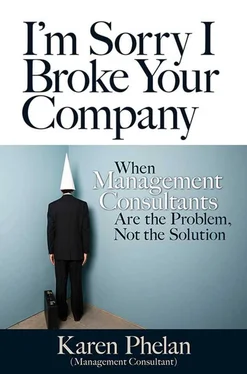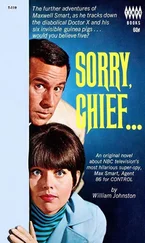Karen Phelan - I'm Sorry I broke Your Company
Здесь есть возможность читать онлайн «Karen Phelan - I'm Sorry I broke Your Company» весь текст электронной книги совершенно бесплатно (целиком полную версию без сокращений). В некоторых случаях можно слушать аудио, скачать через торрент в формате fb2 и присутствует краткое содержание. Город: San Francisco, Год выпуска: 2013, ISBN: 2013, Издательство: Berrett-Koehler Publishers, Жанр: management, popular_business, на английском языке. Описание произведения, (предисловие) а так же отзывы посетителей доступны на портале библиотеки ЛибКат.
- Название:I'm Sorry I broke Your Company
- Автор:
- Издательство:Berrett-Koehler Publishers
- Жанр:
- Год:2013
- Город:San Francisco
- ISBN:978-1-60994-740-8; 978-1-60994-741-5
- Рейтинг книги:3 / 5. Голосов: 1
-
Избранное:Добавить в избранное
- Отзывы:
-
Ваша оценка:
- 60
- 1
- 2
- 3
- 4
- 5
I'm Sorry I broke Your Company: краткое содержание, описание и аннотация
Предлагаем к чтению аннотацию, описание, краткое содержание или предисловие (зависит от того, что написал сам автор книги «I'm Sorry I broke Your Company»). Если вы не нашли необходимую информацию о книге — напишите в комментариях, мы постараемся отыскать её.
I'm Sorry I broke Your Company — читать онлайн бесплатно полную книгу (весь текст) целиком
Ниже представлен текст книги, разбитый по страницам. Система сохранения места последней прочитанной страницы, позволяет с удобством читать онлайн бесплатно книгу «I'm Sorry I broke Your Company», без необходимости каждый раз заново искать на чём Вы остановились. Поставьте закладку, и сможете в любой момент перейти на страницу, на которой закончили чтение.
Интервал:
Закладка:
I am not sure who coined the acronym «SMART.» While Peter Drucker has written about goal setting and is credited with management by objectives, he did not coin the term. Dr. George Doran claims to have originated the use of the acronym, but others have said it was in use before him. Also, some people use the acronym «SMARTER,» with the E and R being used for some kind of evaluate/reevaluate step. I have yet to see the acronym «SMARTEST,» so I'm going to claim it: E for «evaluate,» S for «sign-off,» and T for «throw-away.» (My trademark application is pending.)
Many US companies are moving away from GAAP and adopting international financial reporting standards to conduct global business more seamlessly. However, to me this is just further evidence of the subjective nature of finance and accounting.
Chapter 4
A good overview of the above-average effect is «The Better-Than-Average Effect» by Mark D. Alicke and Olesya Govorun in the book The Self in Social Judgment.
In addition to Alfie Kohns and Daniel Pinks popular works, other sources that show how monetary rewards can be harmful are
• Florian Ederer and Gustavo Manso’s in «Is Pay-for-Performance Detrimental to Innovation?»
• Jeffrey Pfeffers «Six Dangerous Myths About Pay» in the May-June 1998 edition of HBR
• Michael J. Cooper, Huseyin Gulen, and P. Raghavendra Rau’s «Performance for Pay? The Relationship Between CEO Incentive Compensation and Future Stock Price Performance»
Plus,Teresa Amabile is doing research in how to best motivate your employees, and It's not money. Her book is The Progress Principle.
The Marc Hodak article is «Pay for Performance: Beating ‘Best Practices,’» which appeared in Chief Executive, July/August 2006.
The book in which Peter Drucker outlined management by objectives is The Practice of Management , published in 1954.1 haven’t read this one.
Chapter 5
The book First, Break All the Rules , by Marcus Buckingham and Curt Coffman, cites Gallup research showing poor managers as a top reason people leave their jobs. The Successful Manager's Handbook is even longer these days. I have the sixth edition, published in 2000. A later edition was published in 2004.
Daniel Goleman’s model was published in the March-April 2000 edition of HBR in an article entitled «Leadership That Gets Results.»
I tend to rely on the Harvard Business Review because I have subscribed for years and because that is where most new theories on business management get published. Plus, it is much easier and cheaper to read an HBR article than to buy and read a whole book — even better because the journal includes synopses of the articles.
The New York Times article on Google was called «Google’s Quest to Build a Better Boss,» in March 2011.
Chapter 6
McKinsey consultants’ laying the blame for the failure of their principles on Enron’s implementation is from an article in the UK Guardian Observer , «The Firm That Built the House of Enron,» March 23,2002.
Jack Welch was famous for firing the bottom 10 percent at GE before The War for Talent was published.
My information on Einstein was drawn from a number of sources, including the Nobel Prize website biographies, Biography.com, Einstein.biz, Wikipedia (sorry), Einstein, the Nobody —a Nova documentary, New York Times articles and obituary, and a short biography by Antonio Moreno Gonzalez.
My information on U. S. Grant was drawn from his personal memoirs, a biography by Jean Edward Smith called Grant , Biography.com, and America's Civil War magazine (online version), including an article called «Ulysses S. Grants Lifelong Struggle with Alcohol.»
The original study of the students was by Robert Rosenthal and Lenore Jacobson and was published in a 1968 article called «Pygmalion in the Classroom: Teacher Expectation and Pupils’Intellectual Development.» They have a more recent book by the same name.
The labeling effect goes by other names, including «the Pygmalion effect» and «the Rosenthal effect,» after the experiment above, as well as «stereotyping» and «self-fulfilling prophecy.»
The paper about the Peter Principle is by Alessandro Pluchino, Andrea Rapisarda, and Cesare Garofalo and is called «The Peter Principle Revisited: A Computational Study,» published in October 2009.
Einstein himself complained that mathematicians considered him to be a physicist and physicists considered him to be a mathematician. This statement was from an April 24, 2004, New York Times article called «From Companions Lost Diary, A Portrait of Einstein in Old Age.»
Chapter 7
I realize that the examples of good leaders are all male and mostly American. I wanted to choose well-known examples so readers would know something of the lives of the leaders I discuss. Because of the dominance of American culture, I am making the assumption that non-Americans may know something of the American leaders, while the reverse is less likely to be true.
Jefferson’s dislike of public speaking is documented in various places, including «The Master of Monticello,» a New York Times book review that includes an excerpt from American Sphinx: The Character of Thomas Jefferson by Joseph J. Ellis.
Information about the State of the Union messages is from the National Archives website. Jefferson’s tradition of sending a report to Congress held for about a century until Woodrow Wilson addressed Congress in person.
Again, you can find Daniel Goleman’s leadership traits in «Leadership That Gets Results.»
The list of leaders with less-than-stellar people skills is subjective, and some may take issue with my choices. Mostly it is based on the press or lack of press these people have received over the course of my lifetime. Here are some of my reasons:
• Larry Ellison —His biography is The Difference Between God and Larry Ellison: God Doesn't Think He's Larry Ellison.
• Carly Fiorina —Two reasons are the glee with which the tech press reported her firing and her comments about Barbara Boxer during her senatorial campaign.
• Meg Whitman —The press has reported on her volatile temper, and her abrasive manner was apparent during her gubernatorial campaign.
• Jack Welch —He seems to work hard to keep himself in the spotlight, his perks from GE after his retirement were quite a surprise, and anyone who insists on firing the bottom 10 percent is problematic in my book.
• Michael Eisner —He had well-publicized feuds with Jeffrey Katzenberg and Michael Ovitz, among others.
Whitman, Fiorina, and Eisner are all cited in the Forbes «Seven Habits of Spectacularly Unsuccessful CEOs Hall of Shame,» February 9,2012, for bad personal behavior.
Sam Walton, Lou Gerstner, Warren Buffett, Herb Kelleher, and Walt Disney are usually reported to be nice guys and lack the negative press that CEOs often receive.
Information about Steve Jobs was from Walter Isaacsons «The Genius of Jobs,’’published in the New York Times on October 30,2011, and also his best-selling biography, Steve Jobs. Other sources were an interview with 60 Minutes , a short biography by Romain Moisescot, and websites including the Apple Museum (applemuseum.bott.org).
The information about Manfred Kets de Vries was from a January 2004 article in Harvard Business Review called «Putting Leaders on the Couch: A Conversation with Manfred F. R. Kets de Vries,» as well as his official website, http://www.ketsdevries.com.
Читать дальшеИнтервал:
Закладка:
Похожие книги на «I'm Sorry I broke Your Company»
Представляем Вашему вниманию похожие книги на «I'm Sorry I broke Your Company» списком для выбора. Мы отобрали схожую по названию и смыслу литературу в надежде предоставить читателям больше вариантов отыскать новые, интересные, ещё непрочитанные произведения.
Обсуждение, отзывы о книге «I'm Sorry I broke Your Company» и просто собственные мнения читателей. Оставьте ваши комментарии, напишите, что Вы думаете о произведении, его смысле или главных героях. Укажите что конкретно понравилось, а что нет, и почему Вы так считаете.












